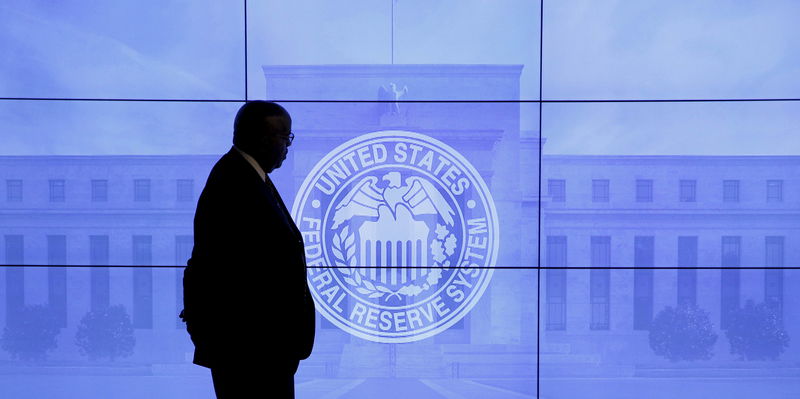Investing.com - Global financial markets will be busy with central bank meetings in the week ahead, with policy decisions due in the U.S., U.K. and Japan.
Investors will also keep an eye out on key economic data, with the monthly U.S. employment report and euro zone inflation data in the spotlight.
Ahead of the coming week, Investing.com has compiled a list of the five biggest events on the economic calendar that are most likely to affect the markets.
1. Federal Reserve Rate Decision
The Federal Reserve is not expected to take action on interest rates at the conclusion of its two-day policy meeting at 2:00PM ET (19:00GMT) on Wednesday. The central bank will also release its latest statement as investors look for any change in language which could point more clearly to a near-term rate hike.
The Fed indicated last month that at least three rate increases were in the offing for 2017. However, traders remained unconvinced. Instead, markets are pricing in just two rate hikes during the course of this year, according to Investing.com’s Fed Rate Monitor Tool.
According to a recent Reuters poll, borrowing costs will remain on hold until the second quarter, when another 25-basis-point hike is likely.
2. Bank of England Policy Announcement
The Bank of England will announce its rate decision at 12:00GMT (7:00AM ET) on Thursday, with analysts expecting no change in policy. The British central bank will also publish its quarterly Inflation Report.
Market experts expect the BOE to stick to their neutral stance on whether to cut or raise interest rates in future, due to the scale of uncertainty about the impact of last year's referendum decision to leave the European Union.
Besides the BOE, traders will focus on a trio of reports on activity in the manufacturing, construction and services sectors for further indications on the continued effect that the Brexit decision is having on the economy.
3. Bank of Japan Monetary Policy Decision
The Bank of Japan's latest rate decision and monetary policy statement are due during Asian hours on Tuesday. BOJ Governor Haruhiko Kuroda will hold a press conference afterward to discuss the decision.
A Reuters poll showed on Friday that the Japanese central bank is expected to leave its monetary policy settings unchanged amid signs of a more sure-footed economic recovery.
According to the poll, the BOJ will hold its short-term policy interest rate at minus 0.1% and the 10-year government bond yield target at around 0%, while maintaining the net amount of Japanese government bonds it buys annually at around 80 trillion yen.
4. U.S. January Nonfarm Payrolls Report
The U.S. Labor Department will release its January nonfarm payrolls report at 8:30AM ET (13:30GMT) on Friday.
The consensus forecast is that the data will show jobs growth of 171,000, following an increase of 156,000 in December, the unemployment rate is forecast to hold steady at 4.7%, while average hourly earnings are expected to rise 0.3% after gaining 0.4% a month earlier.
An upbeat employment report will point to an improving economy and support the case for higher interest rates in the coming months, while a weak report would add to uncertainty over the economic outlook and push prospects of tighter monetary policy further off the table.
Besides the employment report, this week's calendar also features U.S. data on personal income and spending, employment costs, consumer confidence, manufacturing and service sector growth, weekly jobless claims, nonfarm productivity and unit labor costs as well as factory orders.
Despite the flurry of data, headlines from Washington could continue to dictate market sentiment this week, as traders focus on President Donald Trump for further details on his promises of tax reform, infrastructure spending and deregulation as well as trade policies.
Earnings from tech giants Apple (NASDAQ:AAPL), Amazon (NASDAQ:AMZN), Facebook (NASDAQ:FB) as well as major drug companies Merck (NYSE:MRK) and Pfizer (NYSE:PFE) are also on the radar this week.
5. Euro Zone Flash January Inflation Figures
The euro zone will publish flash inflation figures for January at 10:00GMT (5:00AM ET) Tuesday.
The consensus forecast is that the report will show consumer prices rose 1.5%, rising back toward the European Central Bank's 2% target and accelerating from a gain of 1.1% in December. Core prices are expected to increase 0.9%, unchanged from the prior month.
Despite the upward trend in inflation, ECB President Mario Draghi recently downplayed the significance of rising consumer prices, saying that underlying inflation pressure remains “subdued.”
Besides inflation data, the euro zone will also release preliminary fourth-quarter growth figures on Tuesday, while the European Commission is scheduled to publish updated economic forecasts for the region on Wednesday.
Stay up-to-date on all of this week's economic events by visiting: http://www.investing.com/economic-calendar/
